© 2025 ALLCITY Network Inc.
All rights reserved.

The dream isn’t technically dead, but at this point, it feels highly unlikely the stars will align for that blockbuster Kevin Durant trade to the Phoenix Suns.
After weeks of reports that the Brooklyn Nets were not interested in a long-term Kyrie Irving extension, it felt certain the seven-time All-Star would entertain his options elsewhere. Instead, Monday’s news cycle presented an unexpected curveball.
According to The Athletic’s Shams Charania, Irving will opt into his $37 million player option to remain with in Brooklyn:
Technically, there’s still hope. Irving’s decision to opt in indicates he’s ready to run it back alongside KD for another year, “bypassing on multiple opt-in and trade scenarios.” But the truth is, this isn’t his decision. The Nets are clearly fed up with his antics and refusal to get vaccinated, and they can still trade him as an expiring $37 million contract — at which point Durant will want out. Even being under contract through 2026, he has more than enough star power to force his way out.
At that point, the Nets would be better off reshuffling the deck with the haul of young players and draft picks they’d get for their two All-Stars. If that scenario somehow comes to fruition, rest assured we’ll circle back and revisit these possible Suns packages for KD.
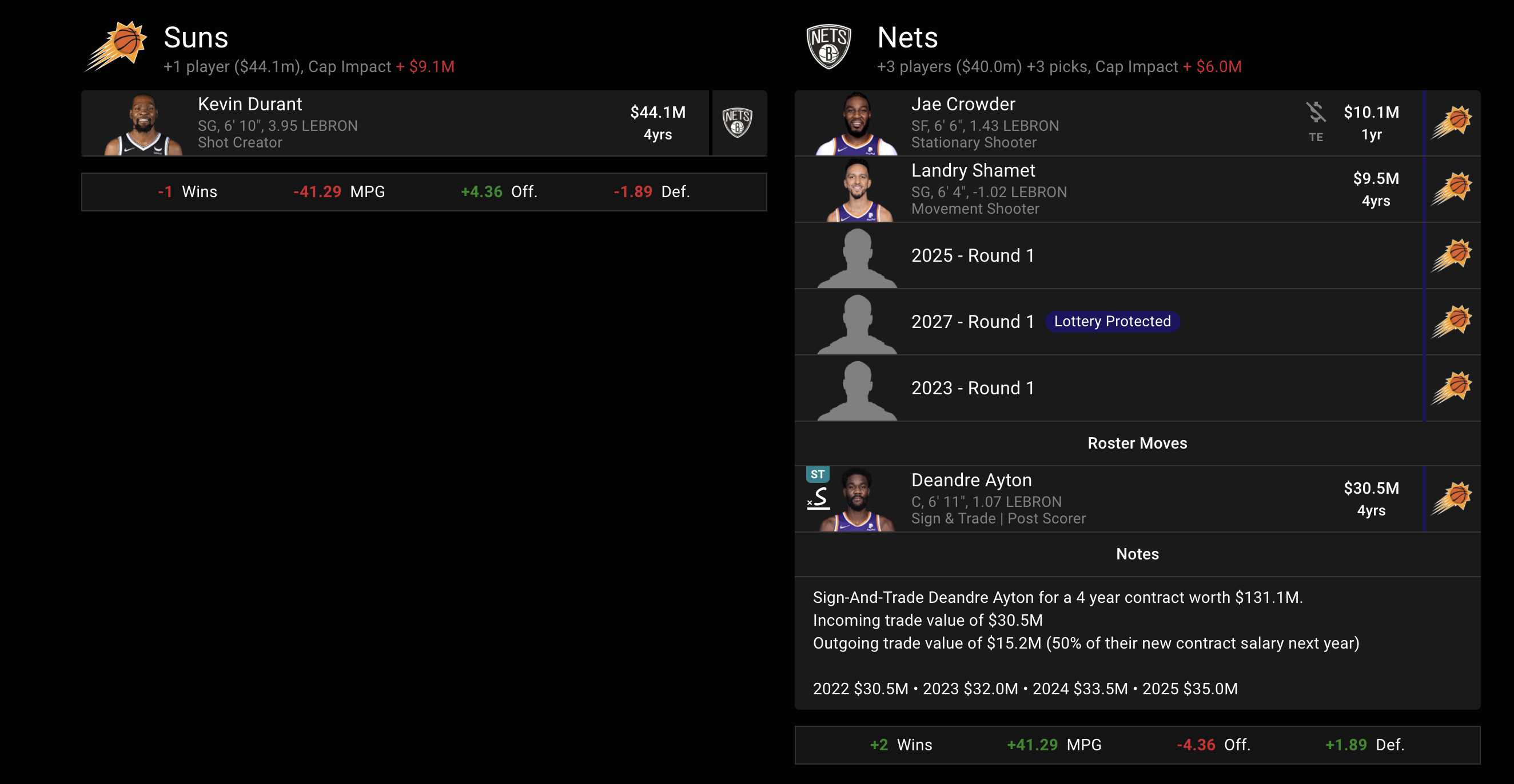
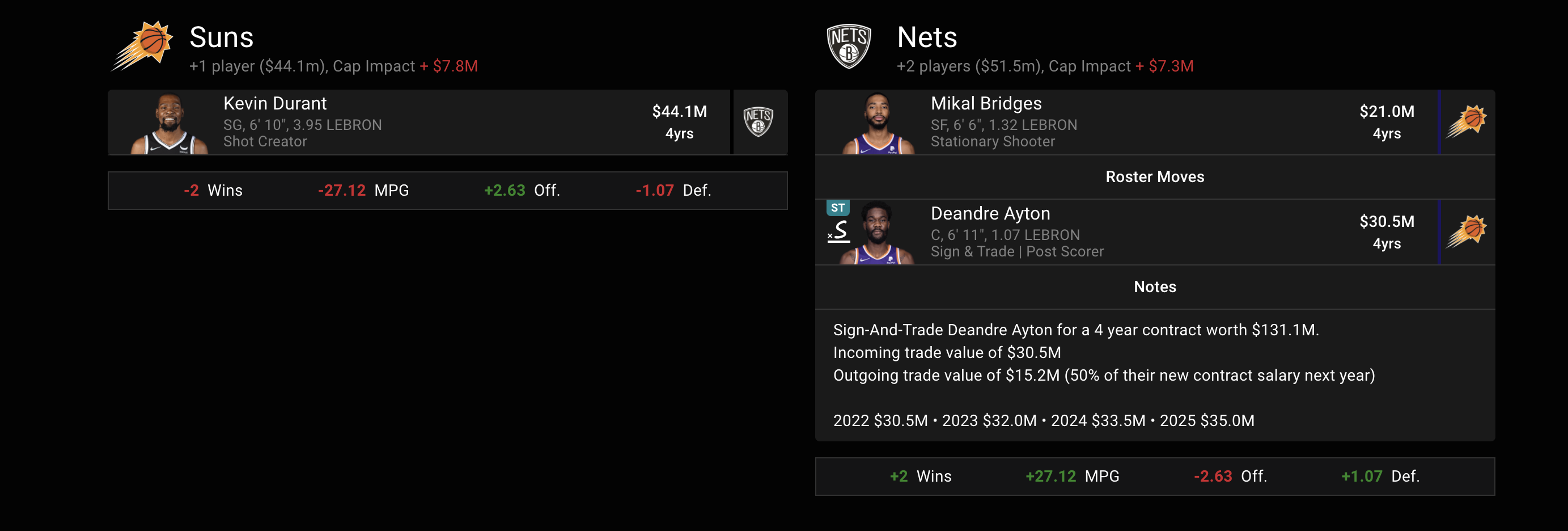
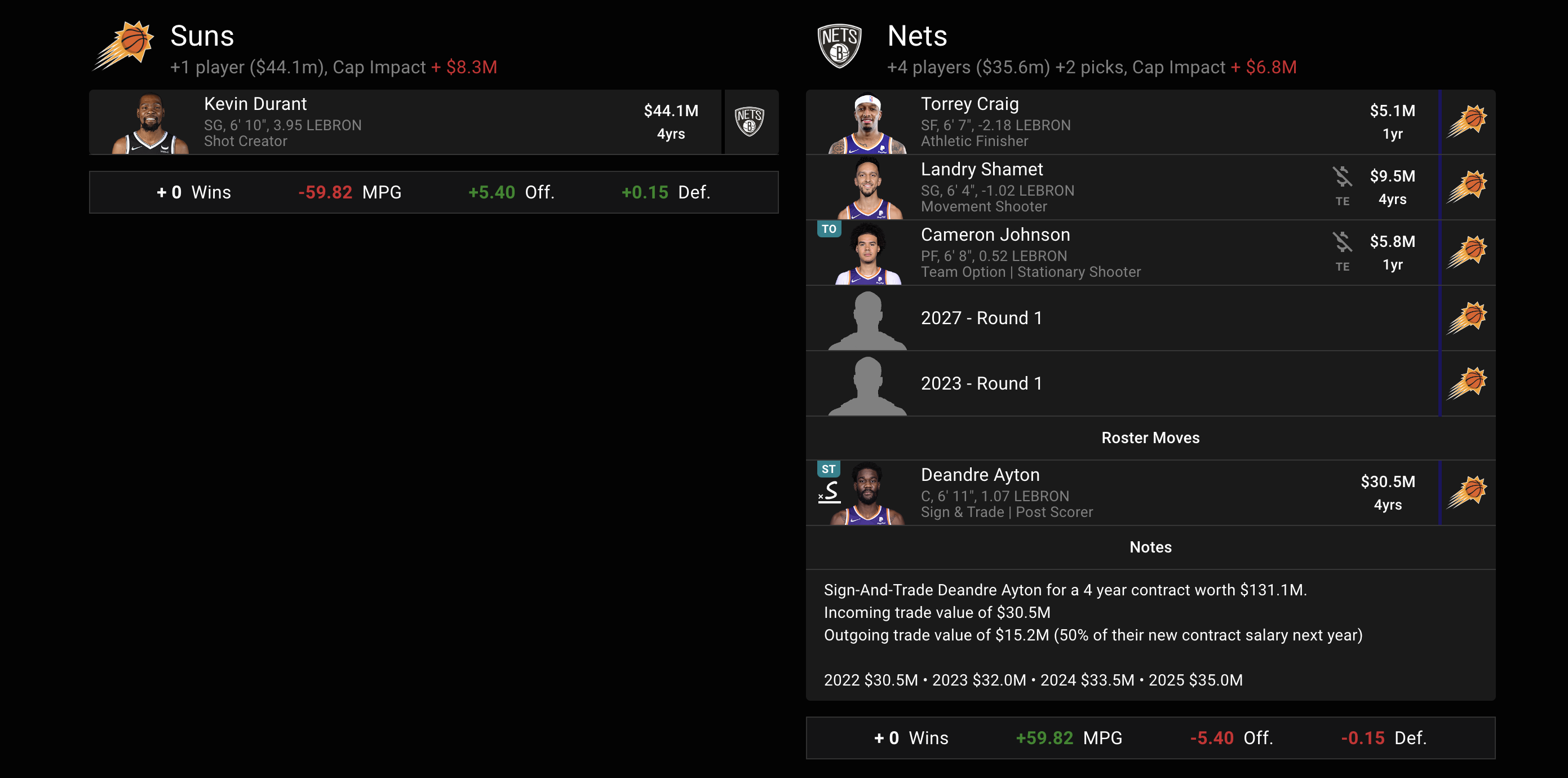
For now, we’ll operate under the premise that Irving’s temporary return appeases Durant through at least the offseason. If KD’s off the table, the Suns’ best course of action is to keep the core intact — re-sign or match an offer sheet for Deandre Ayton in restricted free agency, extend Cam Johnson and give Devin Booker his super-max. From there, they’d need to put their mid-level exception to good use, preferably on a more reliable ball-handler and shot creator behind Chris Paul.
But in the interest of being thorough, consider this a thought exercise on a few other avenues Phoenix could explore to bolster the roster. Paul’s window won’t stay open forever at 37, which means the time is now for general manager James Jones to make one more high-profile move to put the Suns over the top.
Malcolm Brogdon
In terms of Cam Payne upgrades, combo guards who could play next to CP3/Devin Booker, and guys who could spot-start for Paul, the Suns might not be able to do better this summer than Malcolm Brogdon.
There are some understandable concerns. Brogdon turns 30 in December, which would make him more of a stopgap after Paul than a long-term successor. He only played 36 games last season due to injury, and he shot a career-worst 31.2 percent from 3-point range.
However, Brogdon was still good for a 19-6-5 stat line, and he’s averaged 18.9 points and 6.3 assists per game over three years with the Indiana Pacers. That 3-point efficiency is bound to bounce back, given that he’s a career 37.6 percent shooter, and aside from Ayton and John Collins, nobody’s name comes up in trade rumors more often than Brogdon. Most recently, NBA insider Marc Stein reported he’s among the most likely to be traded soon, which makes sense: The Pacers now have Tyrese Haliburton, Chris Duarte, Buddy Hield and rookie Bennedict Mathurin in the backcourt.
With three years and $67.6 million remaining on his contract, Brogdon could play out the last few years of his prime in Phoenix, plugging a big need for individual shot creation, facilitation and steady two-way play whenever Book or CP3 needs a breather. Given his $22.6 million salary for next season, a package of Jae Crowder, Landry Shamet and the Suns’ 2023 first-round pick works financially.

The Pacers would be getting a well-respected veteran in Crowder, who’s on a $10.2 million expiring deal. Shamet is on the books for four more years, but it’s an easy contract to move since the third year is non-guaranteed and the fourth year is a team option. Indiana would then pocket a first-rounder, which they might prefer to push back to 2025, when it could be more valuable than a 2023 pick that’ll probably land in the 25-30 range.
However, since there may be a small bidding war for Brogdon’s services, that package may not be enough to get the job done. Phoenix would have to think about upping the ante:

Losing Cam Johnson would hurt, and it’s not something the Suns should consider lightly. Indiana would undoubtedly prefer this deal, getting a young, two-way wing who’s already one of the association’s best 3-point snipers. They’d also snag a reserve point guard on a team-friendly contract in Cam Payne.
As for the Suns, they’d be gambling on Brogdon’s durability after an injury-stricken year — worth it if they feel he pushes them closer to a championship, but certainly a risk considering they could easily have Johnson under team control for the foreseeable future.
The inclusion of Oshae Brissett softens that blow a little bit. His overall numbers aren’t impressive, but he finished strong down the stretch of Indiana’s season, averaging 14.1 points and 7.0 rebounds over his last 25 games. It’s worth noting, however, that he did so on 41.1 percent shooting (35 percent from 3), and the Pacers only went 6-19 over that span.
If that deal is too rich for Jones’ blood, and because we need to be prepared with DA sign-and-trade options, this is yet another alternative that’s similar to the Myles Turner deals we’ve explored before:
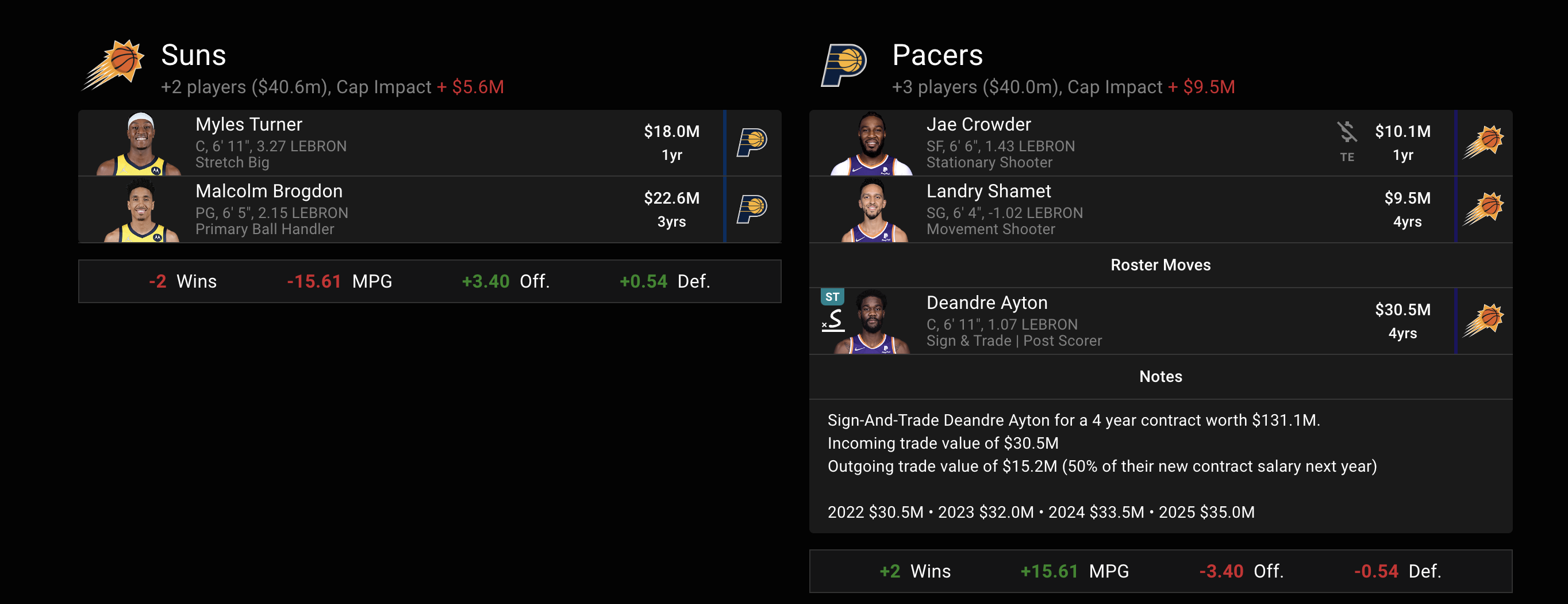
Due to base-year compensation rules in sign-and-trades, Ayton’s outgoing salary only counts for half ($15.25 million) of his new starting salary ($30.5 million). This deal checks out financially on the Suns’ side, and the Pacers have enough cap space to absorb the extra salary they’d be receiving.
A trade like this only makes sense if the Suns are truly done with Ayton, since they’d be downgrading at the center spot. Although he’s a better rim protector and more capable 3-point threat, Turner’s also nowhere near as mobile or switchable on the perimeter. He’s not the most accurate 3-point shooter (34.9 percent), and if Suns fans thought Ayton’s rebounding was frustrating, Turner’s career 6.7 rebounds per game would be a constant source of grief.
This last scenario is hardly the sexiest option, but if Phoenix chooses to move on from DA, adding a league-leading shot-blocker and an additional ball-handler in Brogdon wouldn’t be the worst outcome.
Eric Gordon
We’ve written at length about Eric Gordon trade scenarios before…back in January…ahead of the trade deadline, when they made sense.
It’s almost comical that after Jones (understandably) ducked a question about Gordon during his exit interviews, a few weeks later, reports surface that Phoenix is still interested in the Houston Rockets guard.
On the one hand, Gordon will turn 34 in December, did not finish the season well and is owed $19.6 million next year, plus another $20.9 million in 2023-24. On the other hand, he’s got plenty of familiarity with both Chris Paul and Monty Williams, the Houston Rockets were tanking anyway, and the final year of his contract is non-guaranteed.
To that end, getting a guy who shot 41.2 percent from deep last year to come off the bench would help in the shot creation department. Williams casually mentioned last year that the majority of the Suns’ shooters are catch-and-shoot guys, but even in his early 30s, Gordon is still capable of getting to his spots and launching off the dribble.
If all it costs is Shamet, Dario Saric’s expiring contract and a protected first-round pick, is that worth it for Jones?

Granted, this is probably the least enticing target on the list. However, it’d also cost Phoenix the least, especially since it’s unknown when Saric will be ready to play — and what level he’s capable of playing at — coming off another knee injury.
The Rockets get Saric’s expiring deal, a good role player and shooter on a movable contract in Shamet, and pocket the first-rounder they’ve coveted in a Gordon deal. The time to move him is now, and depending on the market, Houston might not do much better than this.
Gordon doesn’t drastically move the needle for the Suns, but he gives them another trustworthy piece to plug into an eight-man playoff rotation.
Dejounte Murray
It’s entirely possible the San Antonio Spurs have no interest in trading away their best player. The Dejounte Murray trade conjecture we’ve heard — that the Spurs discussed him in a John Collins-focused trade and expected a “Jrue Holiday-like package” in return — seemed like a ploy from the Atlanta Hawks to drive up the asking price of their big man.
But those talks are reportedly ongoing, and it appears San Antonio is at least entertaining the idea of getting ahead of Murray’s next contract — likely a max deal — in 2024. If Murray is actually available, he’d be the absolute best player the Suns can realistically add on the trade market outside of Kevin Durant.
It’d also cost quite a bit to get him. A Mikal Bridges-based deal would work financially, but it wouldn’t make sense for Phoenix to trade their best forward while adding another guard to their Paul-Booker backcourt. Bridges alone wouldn’t be enough for Murray, coming off his first All-Star season, but Bridges and Cam Johnson would be too much.
Fortunately, the Spurs seem to be all aboard the draft picks express. It’s a steep price for any team to pay, but in the Suns’ case, being able to win now and secure a long-term All-Star at point guard might be worth mortgaging the future — especially as a team that doesn’t place as much value in the draft anyway.
To that end, Murray makes a lot of sense if the Suns remain gung-ho on an Ayton sign-and-trade. The Spurs have long been one of the most sensible destinations for him, and they have the extra cap space to make the math work:
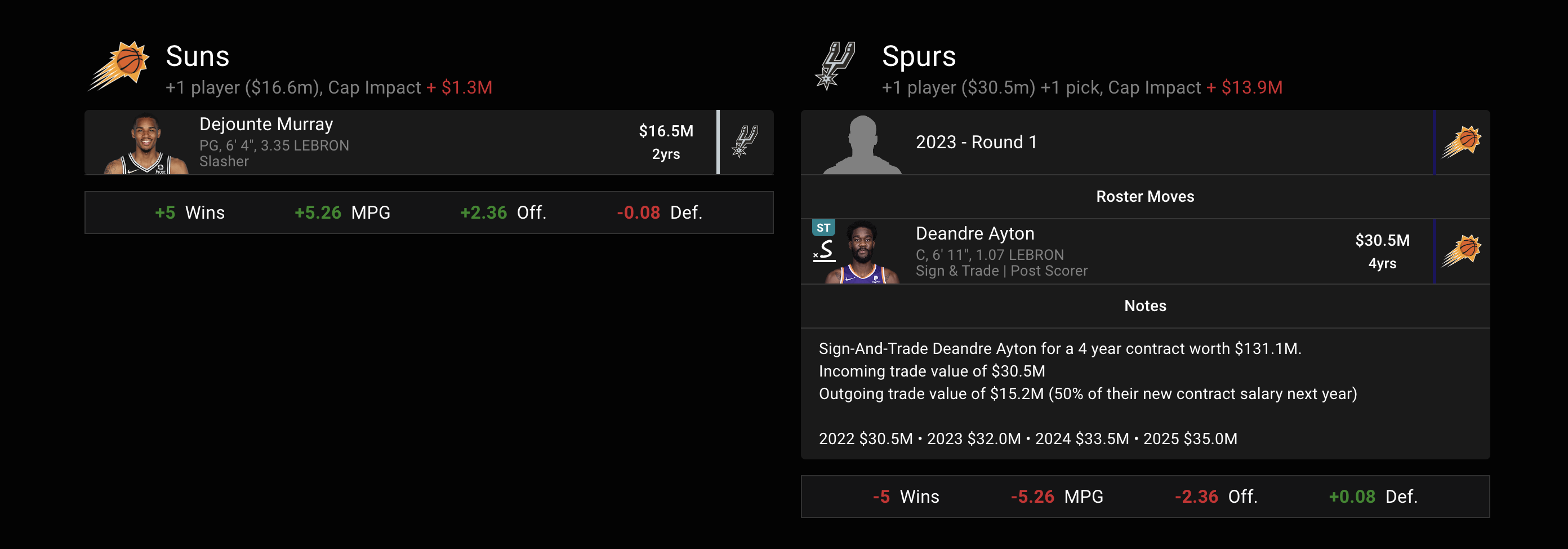
This first option may not be enough for the Spurs’ liking if they’re holding out for a Jrue Holiday-esque return. But Ayton is a better centerpiece than Collins, and tossing in at least one first-rounder (either in 2023 or beyond, whenever San Antonio prefers) sweetens the pot.
Another rendition could expand the trade and add Jakob Poeltl to the mix. As we’ve covered before, Poeltl is perpetually underrated. He’s coming off a season in which he averaged a career-high 13.5 points, 9.3 rebounds, 2.8 assists and 1.7 blocks per game, and he’s still only 26 years old. The 7-footer shot 61.8 percent from the field, has a decent midrange shot and is quietly one of the NBA’s best defenders and rim protectors at his position.
Is he Ayton on the perimeter? No. But Poeltl is on a cheap expiring contract, which means the Suns could replace him if he didn’t pan out and could still retain him if he did. Mathematically, tossing in Landry Shamet gets the job done, as the Spurs eat some extra salary thanks to their cap space:
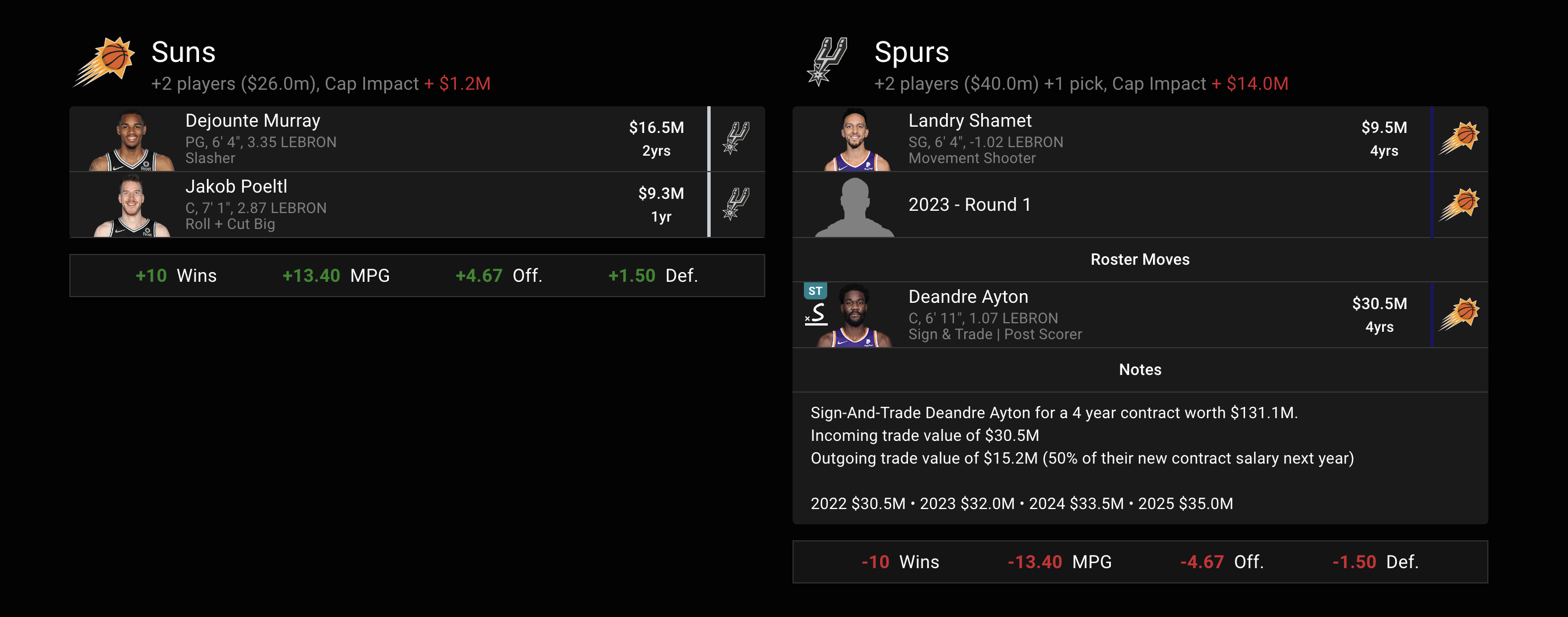
If that’s still not enough for San Antonio, the Suns could try one more time by slightly tweaking their offer. In this scenario, the Spurs have no interest in two guaranteed years of Shamet, opting for Saric’s expiring contract and an additional first-rounder in 2025.
Maybe that lets the Suns get away with a top-10 protection on the pick, but Ayton, two first-rounders and an expiring contract is a pretty decent starting point for Murray and Poeltl negotiations.
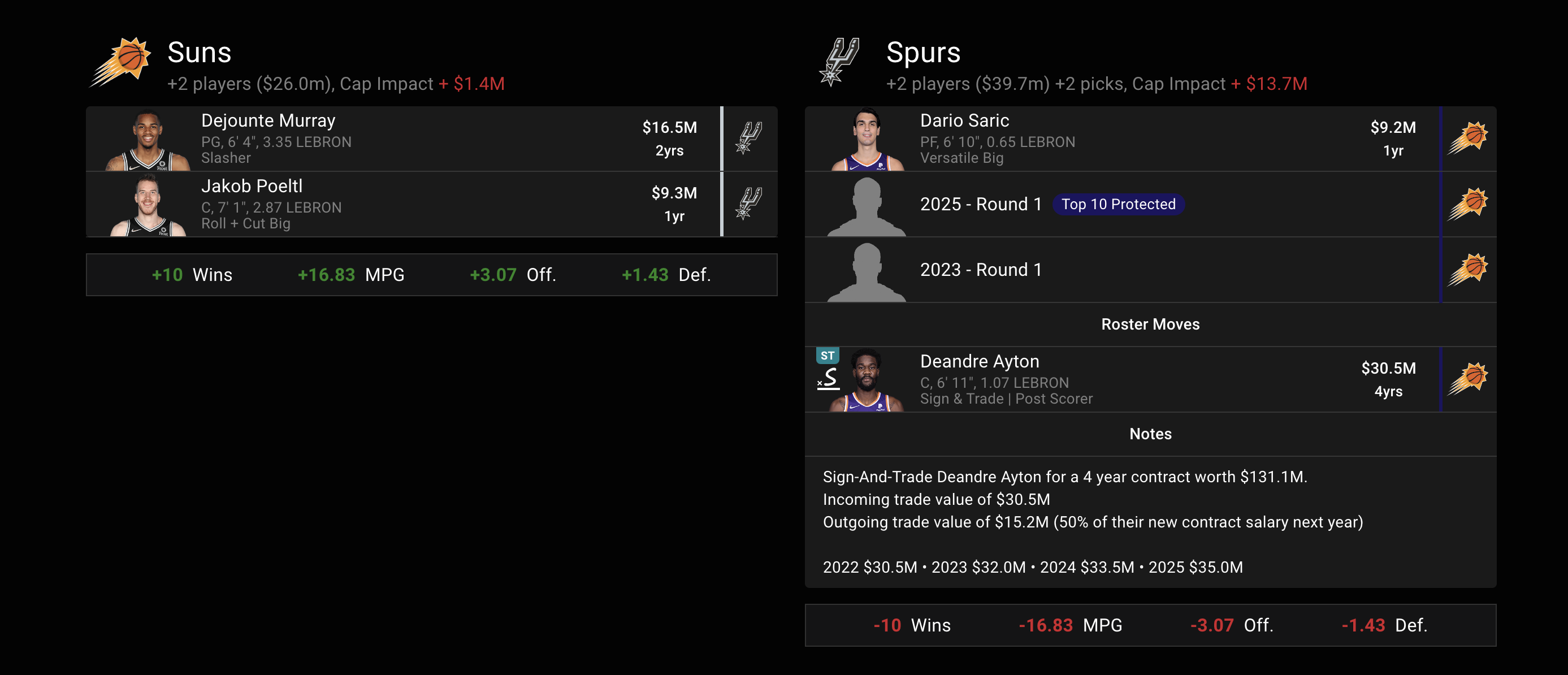
So why would the Suns want Murray? Well, aside from the fact that he’s grown into an All-Star and All-Defensive selection before turning 26 years old, Murray would get to learn from the Point God and become his long-term heir in Phoenix. He just averaged a well-rounded 21.1 points, 9.2 assists, 8.3 rebounds and 2.0 steals per game, and although his 3-point shot is a problem, he’d have enough catch-and-shoot threats around him to mitigate that weakness.
It’d be up to Williams to figure out how to traverse that Paul-Booker-Murray mix, but make no mistake: This isn’t the same as the Goran Dragic-Eric Bledsoe-Isaiah Thomas disaster. The Suns would have three certified All-Stars, plenty of ball-handling, feisty perimeter defense and their future would be set between Book, Murray, Bridges and Cam Johnson.
This would be one of the happy cases where you acquire All-Star talent and figure out the rest as you go.
Harrison Barnes
Harrison Barnes is on an expiring $18.3 million contract, and try as they might to get their act together, the Sacramento Kings still don’t look like a playoff team. To that end, they have to at least consider getting something for Barnes now, before he likely heads for the hills next summer.
In the event they’re taking calls, this might be the rare exception where a Cam Johnson trade actually makes sense.

Again, trading Johnson is not something the Suns should do flippantly. But Barnes would undoubtedly be an upgrade at the 4 over Johnson and Crowder, at least for the upcoming season. He’d extend their ceiling higher as a two-way wing who’s worked hard to be able to create his own offense over the last few years with the Kings and Dallas Mavericks.
Barnes flies under the radar because he’s wasting away in Sacramento, but he’s an efficient, medium-usage player who just put up 16.4 points, 5.6 rebounds and 2.4 assists a night for the Kings. He’s shot 38 percent or better from 3 in each of the last five seasons, can play multiple positions, and he’s got championship experience from his early years with the Golden State Warriors.
Putting him back on a contender is an enticing prospect, since everything he’s learned during his time in Sacramento and Dallas would make him an improved version of himself from his time with the Dubs. The Suns wouldn’t need him to be “the guy,” but rather, “another guy” who can get his own bucket in a pinch.
Tossing in Justin Holiday — another trade deadline target we mentioned in January — would be the icing on the cake. Over the last three years, Holiday has shot 36.7, 38.2 and 40.5 percent from long range. He may be 33 years old, but he’s a reliable bench weapon as a spot-up shooter, and he’s tenacious and long on the defensive end. He’s a free agent next summer too, but this type of move would be cashing all the chips on the table for a 2023 title run anyway.
Losing Johnson would sting, but he’d give the Kings a young piece they’d have under team control for the foreseeable future. That would justify the decision to lose this deal from a talent perspective. Having more shooting with Shamet, plus flexibility with Saric’s expiring deal helps too.
Then again, given that the Kings go full KANGZ from time to time, maybe the Suns could get away with something like this instead?

OG Anunoby
OG Anunoby is another DA sign-and-trade scenario we’ve tackled before, so we’ll keep this brief: Anunoby would be a tremendous get for the Suns if they decided Ayton’s not part of their future.
He wouldn’t plug the center spot full-time, but he’s an imposing, multi-positional defender who could log some small-ball 5 minutes, and he and Bridges would form one of the best defensive wing duos in NBA history. Just imagine the wing lineups Williams could choose from between Booker, Bridges, Crowder, Johnson, Anunoby and Torrey Craig.
Bleacher Report’s Jake Fischer initially reported Anunoby was not happy with the Toronto Raptors, and on draft day, provided an update: The Raptors would only consider dealing OG for an elite center.
Surveying the NBA landscape of the upcoming offseason, only Rudy Gobert or Deandre Ayton fit that category. If Ayton’s out and the Raptors want him, a three-team deal to offload some extra salary (say, Khem Birch and Dalano Banton to the Pacers?) works. A second-round pick would be sent to Indiana for their help facilitating.
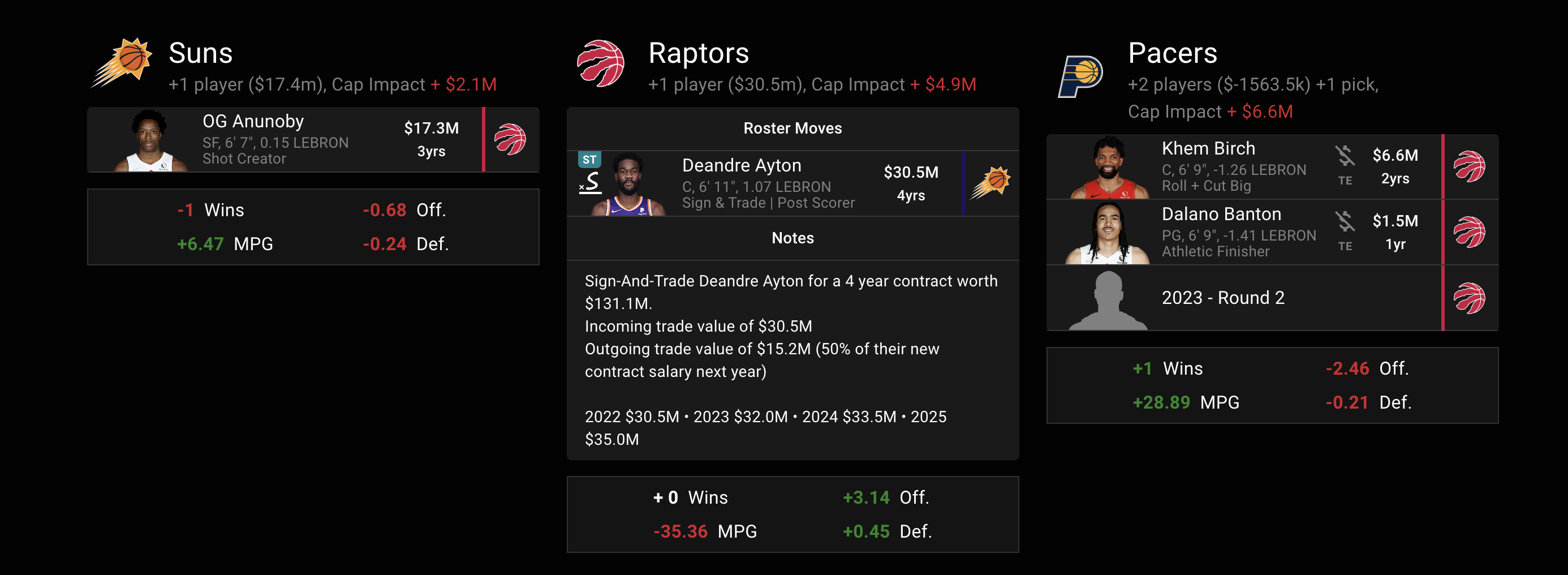
The Suns would then have Anunoby under team contract for at least two more years at a very manageable price (with the third year being a player option). The Raptors wing just put up a career-best 17.1 points and 5.5 rebounds per game, and he’s capable of spreading the floor as a career 37.2 percent shooter from distance.
At just 24 years old, Anunoby’s got a burgeoning offensive game, and though he’ll never be a primary or secondary option on a championship-caliber team, he’d do more than enough on both ends to help Phoenix make a title push.
Comments
Share your thoughts
Join the conversation



